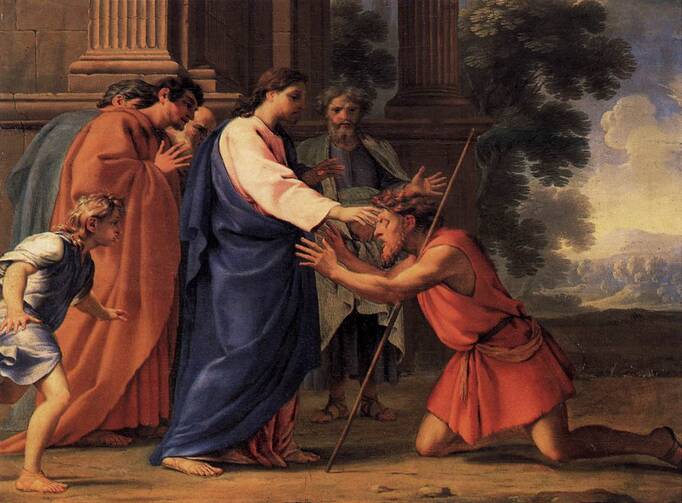How can you let Christ open your eyes?
Last week, we read in the Gospel of John about the woman at the well, who believes in Jesus and inspires others to believe by her preaching. This Sunday, John gives us another unnamed person who becomes a model of faith and discipleship.
'As long as I am in the world, I am the light of the world.' (Jn 9:5)
How can recognizing your spiritual blindness increase your relationship with God?
How do you proclaim Jesus’ significance to the world?
Do you recognize the value of all people in your community?
The narrative begins with an important note about physical ailments. When Jesus and his disciples encounter a man who has been blind since birth, the disciples ask whether he or his parents sinned (Jn 9:3). Their question reflects a view of disabilities as divine punishments. This is an old way of thinking that still persists with some people today. Jesus rejects this attitude: “Neither he nor his parents sinned.” Jesus’ correction of such close-minded thinking should inspire us to value and respect all people.
Then Jesus heals the man with his own saliva. He spits on the ground, makes clay, spreads it on the man’s eyes and instructs the man to wash his face in the pool of Siloam. Using the earth’s resources of dirt and water, Jesus gives this man physical sight.
The story that unfolds has several parallels to the story of the woman at the well. The woman and man both come to believe in Jesus because of his personal encounter with them. For the woman, Jesus tells her about her life (Jn 4:17-18). For the man, Jesus defends and heals him (9:3-7). Both of these people share their experience with the community and affirm Jesus as a prophet (4:19, 9:17). Similarly, Jesus reveals his identity as the Messiah (4:26) and the Son of Man (9:37) directly to the woman and man.
But there are also significant differences between these stories in the reactions of the community. When the woman preaches, the Samaritans come to believe in Jesus; yet when the man repeatedly shares his healing story with the Jewish Pharisees, they condemn Jesus as a sinner who violates the Sabbath. The Pharisees interview the man multiple times, inquire with his parents and press the man to deny Jesus’ healing abilities. Ironically, the Samaritans, who were enemies of the Jews, believe in Jesus and invite him to stay with them while Jesus’ own community rejects him.
At the end of the narrative, Jesus criticizes the Pharisees. When he reveals his identity to the man, Jesus says that he came into the world “so that those who do not see might see, and those who do see might become blind” (Jn 9:39). The Pharisees ask him if he thinks they are blind, and Jesus says, “If you were blind, you would have no sin; but now you are saying, ‘We see,’ so your sin remains.” In this statement, Jesus suggests that the Pharisees are sinful because their self-assurance prevents them from recognizing Jesus’ significance.
Spiritual blindness is often assumed to be a negative attribute, but here John’s Gospel suggests that we must fully appreciate our own spiritual blindness in order to see the light of Christ. As we journey through Lent, we should acknowledge our limitations and seek healing from Christ. Today’s Gospel begins with a physical healing and ends by asserting the importance of spiritual healing.
This article also appeared in print, under the headline “Spiritual Blindness,” in the March 16, 2020, issue.









